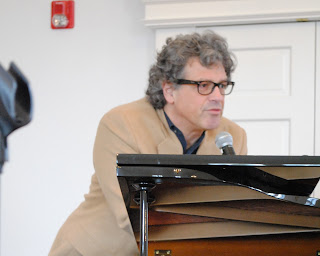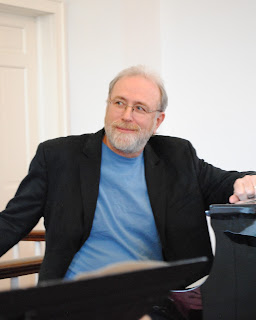 |
| Pound Ridge Community Chirch |
On a beautiful Sunday afternoon in the bucolic village of Pound Ridge , New
York New York University , William Patterson
University
On this Sunday the featured artist was the saxophonist Steve
Slagle and his quartet. Mr. Slagle is an active musician who frequently plays
and tours with his long time collaborator the guitarist Dave Stryker and has
been a musical director of the Mingus Big Band for many years, He is an active
collaborator with musicians as varied as Stevie Wonder and Milton Nascimento to
the saxophonist Joe Lovano. His most recent
release is entitled Evensong on Panorama Int’l Records and features Mr. Stryker on
guitar, Ed Howard on acoustic bass and the drummer McClenty Hunter.
 |
| Steve Slagle photo by Ralph A. Miriello c 2013 |
On this afternoon, playing to a small audience of maybe
fifty congregants, Mr. Slagle was joined by the pianist Bill O’Connell, the
bassist Aidan O’Donnell and the drummer Steve Williams. The group started the
program with the standard “Just in Time” with Mr. Slagle on alto saxophone. His
sound to me was reminiscent of a young Phil Woods, as he has a hard bop
sound that is fluid with a warm timbre. Mr. O’Connell is a large, gangly man who
comps with delicate firmness and solos with a fleet right hand
that possesses a seemingly endless array of ideas. The
drummer Mr. Williams, an animated participant, listens intently to whoever is
soloing and compliments their lines with his own deft punctuation. Mr.
O’Donnell, the youngest of the crew, seemed content to lay down a solid bass
line and revel in the joy of playing with such accomplished contemporaries.
 |
| Steve Williams and Aidan O'Donnell photo by Ralph A. Miriello c 2013 |
For the second song of the set Mr. Slagle offered his own composition titled “Equal Nox”
from his latest release. He explained the song
was written on John Coltrane’s birthday, September 23, which is one of two days
during the year when the day is equally as long as the night. With a cascading
opening evocative of Trane and a catchy vamp, Mr. Slagle employed a searching tone to his
alto. The quartet moved into the tight groove with O’Donnell's walking bass line
anchoring the tune. Mr. Slagle ran arpeggios of sound that often crested in the
high register, all done with superb control. Mr. O’Connell played a
particularly syncopated solo, filling the lines in between his chords slightly
behind the beat.
The third song of the evening was another Slagle
composition, the song “B Like Me” from his latest release Evensong . Slagle played a series of liltingly smooth glissandi as
Williams seems to prod him along with encouraging grunts and smart accents on the
rim of his snare, the two enjoying the interplay.
After a brief reading by Pastor Lori Miller that included a
passage from the Bible, Psalm 107, and a reading of a poem by T.S. Elliot, Mr. Malinverni
reintroduced the group.
 |
| Musical Director Peter Malinverni photo by Ralph A. Mirirello c 2013 |
Mr. Slagle took up his flute to play the Carl Fischer/Frankie
Laine ballad “We’ll Be Together Again” His sensitive sound was bright and airy,
floating over Bill O’Donnell’s block
chords and the plangent bass lines of Mr. O’Donnell. Mr. Williams lent elegant support
on his brushes.
The afternoon’s set ended with a composition by Mr. O’Connell
titled “Pocket Change.” Mr. O’Connell is an accomplished player who in his own
groups has a decidedly Latin inspired tilt to his music. This composition
started in a quick paced 4/8 time changing at intervals to 6/8 time, confiounding the group at first, before they settled into the pattern of the rhythm. Mr. O’Connell’s
playing was inspired with bursts of blazingly fast runs by his right hand. Mr.
Malinverni, himself an accomplished pianist, watched on admiringly.
 |
| Pianist Bill O'Connell photo by Ralph A. Miriello c 2013 |
Mr. Slagle negotiated the mixed rhythms of the song on
his alto with graceful crescendos of his own. The congregation was duly
impressed by his expressive performance and generously applauded the musicians
in a appreciative demonstration of thanks and admiration.
The Jazz Vespers series will continue on Sunday April 24, 2013 witha perfromance by the fine tenor saxophonist Ralph Lalama and his group. There is no cover but a generous donation for the musicians is highly recommended.






